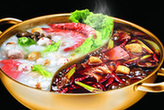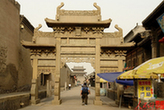|
|
|
|
China was the first country in the world to make vinegar from grain. The written history of vinegar can be traced back to the 8th century BC. During the Spring and Autumn Period, professional vinegar workshop had appeared. The book Qi Min Yao Shu written in Northern Wei Dynasty (AD386-534) collected altogether 22 vinegar production methods, some of which are still in use. In ancient times, vinegar was also called “bitter wine”, “acid wine”, “rice vinegar”, etc. The old saying “Firewood, rice, oil, salt, sauce, vinegar and tea are indispensable in our daily life” indicates that vinegar has played an important role in the life of the Chinese throughout the ages.
As a story goes, a man named Heita, son of Du Kang, wine inventor in China’s Xia Dynasty (c. 21st century-16th century BC) invented vinegar. Heita learned the wine brewing technology from his father and thought it wasteful to just throw the wine lees away, so he stored them in a jar. When he opened the jar some time later, an unknown aroma filled his nostrils. Lured by such a full-bodied aroma, Heita couldn’t help tasting it. It was very delicious with both sourness and sweetness. Then he kept it as a seasoning which was later named “vinegar”.
China has vast territory, abundant resources, and different climates between its south and north. In the long term of productive practice, Chinese locals in different areas created diverse vinegar-making methods and vinegar products of local features, such as Shanxi mature vinegar, Zhenjiang black rice vinegar, Yongchun aged vinegar, Sichuan Baoning bran vinegar, Jiangzhe (referring to Jiangsu and Zhejiang) rose vinegar, Kazuo aged vinegar, Beijing fumigated vinegar, Shanghai rice vinegar, Dandong white vinegar, and Sichuan tribute vinegar. Vinegar is not only a seasoning but is also one of the daily necessities.
Vinegar also has medical value. Ancient book The Prescriptions for Fifty-two Diseases unearthed in Changsha’s Mawangdui of Hunan Province is the earliest book centering on prescription ever found in China. It provides in detail how vinegar was used to treat burns, hernia, gangrene, ringworm, dog bites, etc. Vinegar can relieve fatigue, delay senility, prevent obesity, beautify skin, soften veins, reduce blood fat and cholesterol, and lower the incidence of hepatic diseases. The curing and health-preserving effects of vinegar can also be found in Ben Cao Bei Yao and Ben Cao Gang Mu, historic Chinese medical books . In Japan, “Less salt, more vinegar” is listed second in its Ten Longevity Rules.
Editor: Dong Lin





Why not rent a boyfriend, or girlfriend to please parents during the Spring Festival?